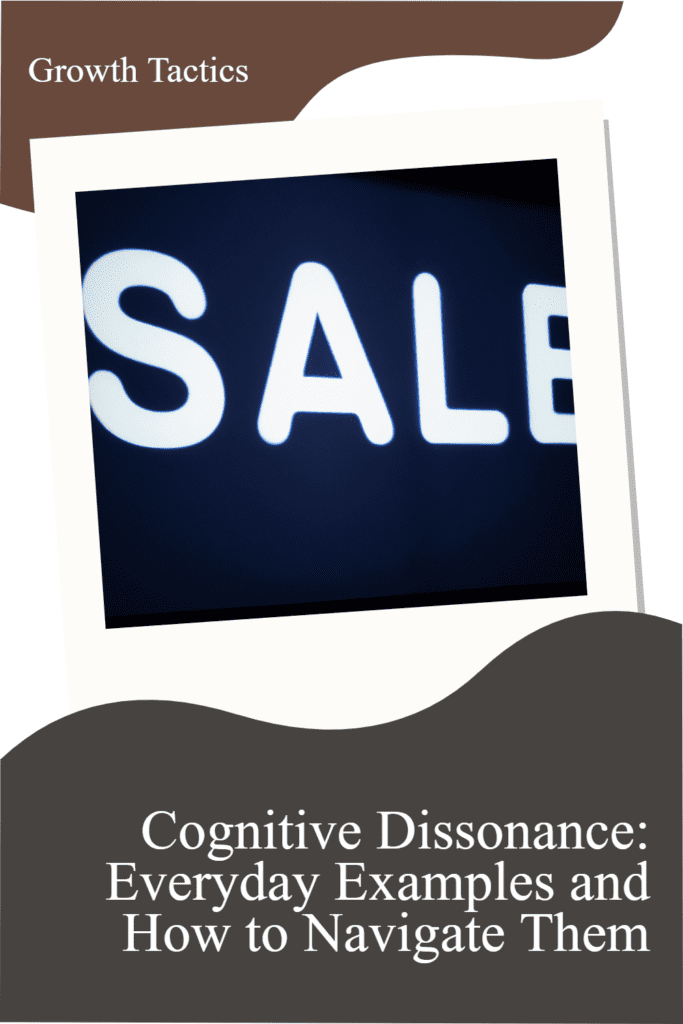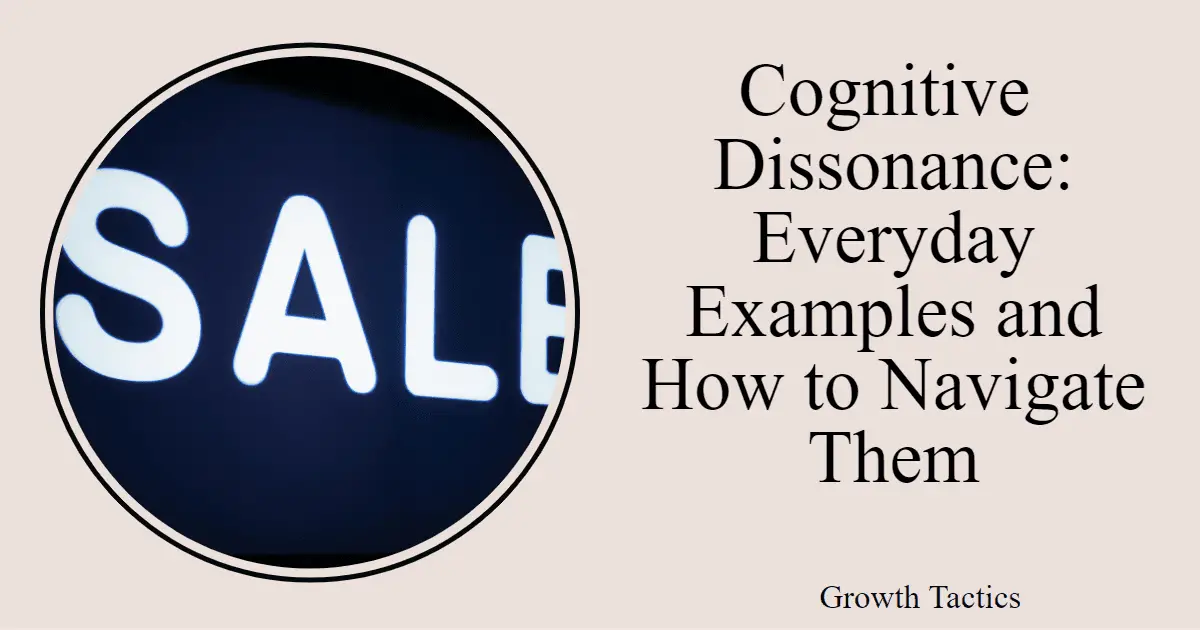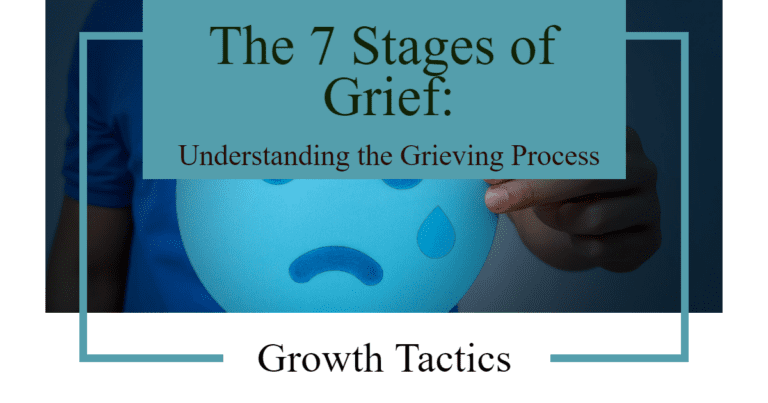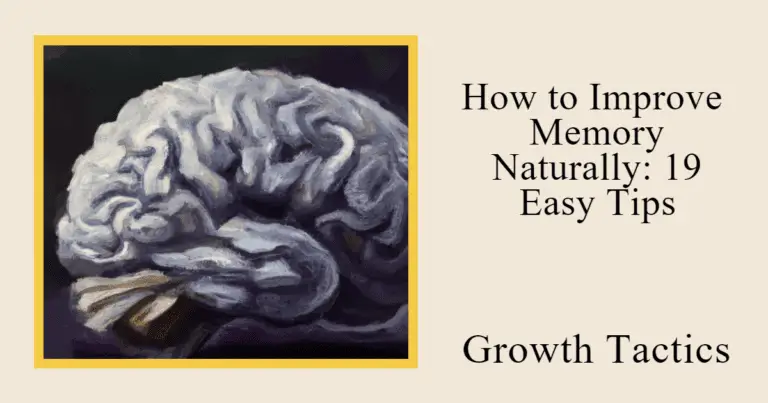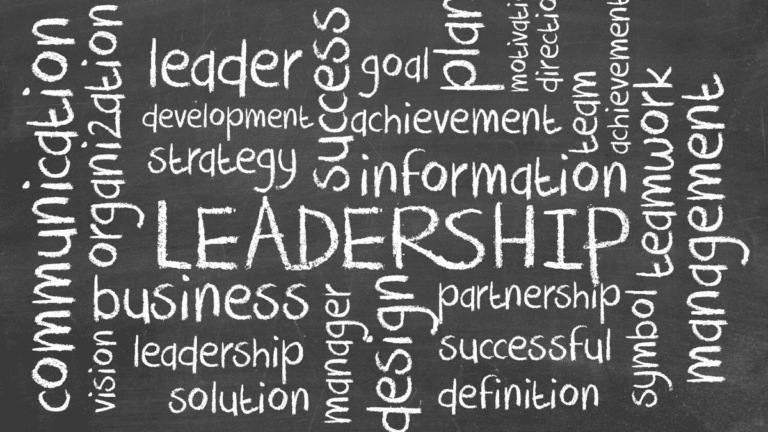Do you ever find yourself puzzled by your own thoughts or behavior? Well, something just might be stirring in your psyche that you’re not entirely aware of. This something is cognitive dissonance, a bit of social psychology that’s in almost everyone’s everyday life.
In this article, we’ll talk about cognitive dissonance and share some everyday examples. By the end, we’ll show you how understanding this concept can help illuminate your decision-making, cultivate a healthier mindset, and even potentially lead to positive changes. Grab your cups of coffee, and let’s dive in!
Jump To Section
What is Cognitive Dissonance?
Picture yourself, just casually browsing your favorite online store, when said store presents you with a giant sale banner. You’re drawn in by the irresistible prices.
But wait, weren’t you just planning to save money this month?
Your actions are contradicting your initial beliefs, and this inconsistency can create a little ping of discomfort in your mind, a sensation known as cognitive dissonance. It is this mental discomfort that Leon Festinger first introduced to the world of social psychology.
Example of Cognitive Dissonance: Have You Been Here?
Remember that time you promised yourself no more late-night snacks only to find yourself halfway through a pint of ice cream in the middle of the night? That’s cognitive dissonance! It’s quite literally like two sides of your brain are in a tug of war, where your cognition and behaviors don’t match up.
More Examples of Cognitive Dissonance
Cognitive dissonance is like a master of disguise, stealthily slipping into our lives in countless forms and situations. Aspiring to be a cognitive dissonance detective? You’re in luck! Let’s take a look at some real-life examples of cognitive dissonance that help to demystify this enigmatic opponent of mental harmony.
The Smoker’s Dilemma
One classic example of cognitive dissonance is the smoker who knows the health risks associated with smoking yet continues to light up. Despite being fully aware of the negative consequences, they justify their behavior with statements such as “I’ll quit someday” or “the damage is already done.”
The Dieter’s Temptation
Picture someone on a quest to shed a few pounds, steadfastly adhering to a strict diet regimen. Suddenly, they face a delicious, calorie-laden dessert and proceed to indulge in it. The guilt and mental struggles that ensue exemplify cognitive dissonance, as their beliefs concerning health and weight loss are in conflict with their actions.
The Environmentalist’s Quandary
A person committed to protecting the environment might feel conflicted after purchasing a gas-guzzling car. Aware of its high contribution to carbon emissions, they may rationalize their choice by citing convenience, style, or safety features.
The Career Conundrum
An employee who takes immense pride in their punctuality and commitment may face cognitive dissonance after arriving late to an important meeting. To alleviate the mental tension, they may blame external factors like traffic instead of acknowledging their own shortcomings.
The Cheater’s Remorse
A person in a committed relationship who succumbs to the temptation of infidelity might be haunted by cognitive dissonance as their actions starkly contradict their belief in loyalty and faithfulness. They might justify their behavior with excuses or downplay the importance of their actions to alleviate the mental discomfort.
The Shopaholic’s Rationalization
We’ve all experienced this common scenario: you’re committed to cutting back on unnecessary spending, but find yourself impulsively buying an expensive pair of shoes. Afterward, you feel the dissonance between your actions and your financial goals, and proceed to rationalize the purchase as a well-deserved reward or a necessity.
The Political Tug of War
Voters often experience cognitive dissonance when their preferred politician or political party engages in behavior contrary to their beliefs. Rather than questioning their loyalty, they may work hard to justify the actions or downplay the significance of the conflicting behavior.
In conclusion, shining a spotlight on these examples of cognitive dissonance helps us identify and acknowledge this intricate web of mental inconsistencies. This newfound understanding can open the door to personal growth as we strive to maintain inner harmony even in the face of life’s countless contradictions. Happy detecting!
The Theory of Cognitive Dissonance
American psychologist Leon Festinger first introduced the theory of cognitive dissonance back in the 1950s. According to Festinger, we have an inner drive to hold our beliefs and actions in harmony. When they don’t align, we feel a sort of mental “itch” that we can’t quite scratch.
Signs of Cognitive Dissonance: A Treasure Map to Your Hidden Inner Conflicts
Imagine your life as a thrilling adventure, and cognitive dissonance is like a buried treasure hidden within your psyche. But how to find it? Well, let’s embark on an exciting journey (complete with treasure map) to uncover the signs of cognitive dissonance and bring those hidden inner conflicts to the surface.
Uncomfortable Feelings
The first sign of cognitive dissonance lies within those nagging, uncomfortable feelings that arise when you find yourself grappling with a contradiction. Whether it’s indecision about an important matter or wrestling with opposing beliefs, this emotional discomfort is a strong indicator that cognitive dissonance has made an appearance.
Guilt or Shame
Feelings of guilt or shame can also serve as red flags for cognitive dissonance. These emotions often pop up when our actions or choices don’t align with our values and beliefs. For example, feeling guilty after indulging in a shopping spree when you’ve committed to saving money signifies cognitive dissonance at play.
Justifications and Rationalizations
Notice yourself making excuses or rationalizing decisions that don’t align with your values? You guessed it – cognitive dissonance is lurking around the corner. One sign of cognitive dissonance is vigorously justifying choices and behaviors that would otherwise create mental tension.
Mental Gymnastics
Cognitive dissonance can lead our minds to engage in seemingly endless, and sometimes bizarre, mental gymnastics. Watch out for instances where you are bending over backward to defend an action or belief that doesn’t naturally fit with your overarching values.
Cognitive Resistance
Another sign of cognitive dissonance is a stubborn reluctance to accept new information that challenges your current beliefs. If you find yourself stubbornly rejecting, ignoring, or downplaying facts that contradict your values, cognitive dissonance may be the culprit.
Procrastination
Believe it or not, procrastination can also be a manifestation of cognitive dissonance. When we are faced with contradictory desires or beliefs, our mind tries to avoid the cognitive dissonance by stalling and postponing decision-making.
The Blame Game
Last but not least, be cautious of situations where you find yourself holding others responsible for actions you took willingly. Blaming others for our decisions can be a way of reducing cognitive dissonance, as it allows us to maintain consistency in our self-perception.
In conclusion, unearthing the signs of cognitive dissonance can offer valuable insight into your inner conflicts and emotional unease. By using this personal treasure map, you’ll be better equipped to navigate the complexities of your mind, uncovering those hidden gems of self-awareness and personal growth. So, strap on your treasure-hunting hat and dare to embrace the adventure of cognitive dissonance!
The Effects of Cognitive Dissonance: Unraveling the Mysteries of the Mind
You’ve probably heard whispers of cognitive dissonance lurking in the background of your thoughts and actions. But what are the real effects of cognitive dissonance on our lives? And more importantly, can unresolved dissonance be harmful to our mental and physical health? Snuggle in and let’s unravel this fascinating mystery together.
A Brewing Storm in the Mind
Cognitive dissonance, when left unaddressed, can create feelings of discomfort, anxiety, and even stress. Think of it like a storm brewing in your mind. The conflicting beliefs or actions undermine your mental stability, producing negative emotions. But don’t worry, fellow explorer, cognitive dissonance in and of itself is not a direct threat to your health. It’s a natural part of the human experience.
It’s All About Balance
While cognitive dissonance might be uncomfortable, the key is understanding how to address these inconsistencies. Like any other mental or emotional process, balance is essential for maintaining our mental wellbeing. In fact, cognitive dissonance can actually have a positive impact when we learn to identify and address it properly. By understanding the root causes of our dissonance, we can make healthier decisions and course correct when needed.
The Ripples of Unresolved Dissonance
On the flip side, when cognitive dissonance is left unresolved, it can lead to more severe psychological distress or even influence our physical health. For instance, someone who smokes while knowing it’s detrimental to their health might develop chronic stress due to the constant dissonance between their behavior and beliefs. Over time, the buildup of stress can contribute to various health issues.
Finding the Silver Lining
Believe it or not, cognitive dissonance can sometimes be a blessing in disguise. When dissonance acts as a catalyst for us to question our current beliefs or behaviors, it can lead to positive changes. For example, someone experiencing dissonance about their environmental impact might become more environmentally conscious and make changes to their lifestyle.
Taming the Dissonance Beast
Cognitive dissonance, though potentially uncomfortable, is not inherently harmful to your health, provided you learn to address it in a balanced manner. The key lies in embracing the discomfort, reflecting on the source of the dissonance, and using it as an opportunity for growth and self-improvement.
So the next time you’re faced with cognitive dissonance, remember: it’s not necessarily harmful when you know how to tackle it head-on. Recognize it as a normal part of life and use it as a gentle nudge to introspect and align your beliefs and actions toward a healthier, happier you.
How to Resolve Cognitive Dissonance
Accept and Reflect
First things first, remember that cognitive dissonance is a natural part of being human. So, take a step back and acknowledge when you’re experiencing dissonance. That moment when you’re reaching for a sugary treat even though you promised yourself a healthier diet? It’s okay, we’ve all been there. Reflect on the conflicting thoughts and feelings and allow yourself to understand your true motivations.
Make a Decision or Change a Belief
A powerful way to resolve cognitive dissonance is by taking action. If you zigged when you meant to zag, don’t dwell on it. Instead, make a decision to either embrace the inconsistency or change it. Remember that time you felt guilty about skipping the gym? You could get back on track with a workout the next day or reevaluate your fitness goals. It’s all about finding what works for you!
Adding New Beliefs and Prioritizing
Another cool trick is to add new beliefs to create a mental equilibrium, cocooning that uncomfortable contradiction. Say you didn’t hit your monthly savings goal because of an irresistible sale. You could introduce a new belief that the items you’ve bought were a one-time necessity, which can help soothe those feelings of dissonance.
Open Yourself Up to Growth
Finally, use cognitive dissonance as a springboard for growth. Those uncomfortable moments often point to areas of our lives that need a little extra love and attention. Embrace the opportunity to learn more about yourself and use this wisdom to make adjustments that create a more harmonious life.
Remember, resolving cognitive dissonance isn’t about going to extremes or making drastic changes. It’s about maintaining your mental balance by understanding that sometimes, life throws us curveballs – and that’s okay.
So, the next time you find yourself grappling with cognitive dissonance, take a deep breath, remember this warm little coffee chat, and know that you’ve got the tools to navigate those tricky mental waters.
How Can Recognizing Dissonance Help You?
Recognizing cognitive dissonance starts with being a mindful observer of your thoughts and actions. Those little moments when you feel uneasy due to a contradiction? That’s your cue! Be it fighting the temptation of a late-night snack, or rationalizing an impulsive shopping spree, these internal inconsistencies are tell-tale signs of cognitive dissonance.
Embrace Contradictions as Opportunities
When you spot cognitive dissonance, rather than shove it under the mental rug, embrace it. Contradictions are not your enemy but opportunities for self-improvement. They shine a spotlight on your cognitive inconsistencies and motivate you to resolve them, paving the way for healthier decisions and behaviors.
Boost Self-awareness
Recognizing cognitive dissonance can crank up your self-awareness, which is an invaluable tool in personal growth. Increased self-awareness can foster more proactive decisions, better stress management, and build resilience and adaptability. So, the next time cognitive dissonance drops by, consider it a personal invitation to unlock greater self-insight.
Spotlight on Decision-making
Another not-so-obvious benefit of recognizing cognitive dissonance is that it can illuminate your decision-making process. You will become better equipped to recognize the factors influencing your choices and address cognitive inconsistencies that may be leading you astray. You’ll be a pro decision-maker before you know it!
Empowering Behavioral Changes
Recognizing cognitive dissonance can be the catalyst for significant behavioral changes. It drives self-reflection, nudging you to evaluate your values, beliefs, and actions. Think of it as a springboard for realigning your behavior with your core beliefs, fostering authenticity and life satisfaction.
Wrapping It Up
In conclusion, cognitive dissonance is a fascinating concept that helps us understand our contradictions and the human quest for cognitive consistency, besides leading to attitude change and positive changes.
Don’t forget:
- Cognitive dissonance is the mental discomfort we experience when our beliefs or actions contradict.
- Rather than being harmful, cognitive dissonance can motivate us to bring our beliefs and actions into alignment.
- Increased self-awareness can help us anticipate cognitive dissonance so we can more proactively manage our thoughts and actions.
- Embracing cognitive dissonance can open the door to personal growth and positive changes.
Embrace cognitive dissonance, don’t shy away. It’s just one more way to get to know yourself a little bit better!
FAQ
What is cognitive dissonance?
Cognitive dissonance refers to the mental discomfort experienced when your actions contradict your initial beliefs or values. This sensation was first introduced by Leon Festinger in the field of social psychology.
Can you provide an everyday example of cognitive dissonance?
Sure! An everyday example of cognitive dissonance is when you promise yourself no more late-night snacks but end up eating ice cream in the middle of the night. The contradiction between your intentions and actions creates cognitive dissonance.
What are other common examples of cognitive dissonance?
Some common examples include:
- A smoker who knows the health risks but continues smoking.
- A dieter indulging in high-calorie desserts despite trying to lose weight.
- An environmentalist buying a gas-guzzling car.
What are the signs of cognitive dissonance?
Signs include uncomfortable feelings, guilt or shame, justifications and rationalizations, mental gymnastics, cognitive resistance, procrastination, and blaming others for your actions.
How can cognitive dissonance affect your mental and physical health?
Unresolved cognitive dissonance can lead to discomfort, anxiety, and stress. Over time, the buildup of stress might contribute to more severe psychological distress and even have an impact on physical health.
How can you resolve cognitive dissonance?
Resolving cognitive dissonance involves addressing the inconsistencies between beliefs and actions. This could mean changing behaviors, reevaluating beliefs, or finding a rational balance between the two.
How can recognizing cognitive dissonance help you?
Recognizing cognitive dissonance can illuminate your decision-making process, cultivate a healthier mindset, and potentially lead to positive changes. Awareness of these internal conflicts helps in personal growth and maintaining mental harmony.
Who introduced the theory of cognitive dissonance?
The theory of cognitive dissonance was introduced by American psychologist Leon Festinger in the 1950s.
